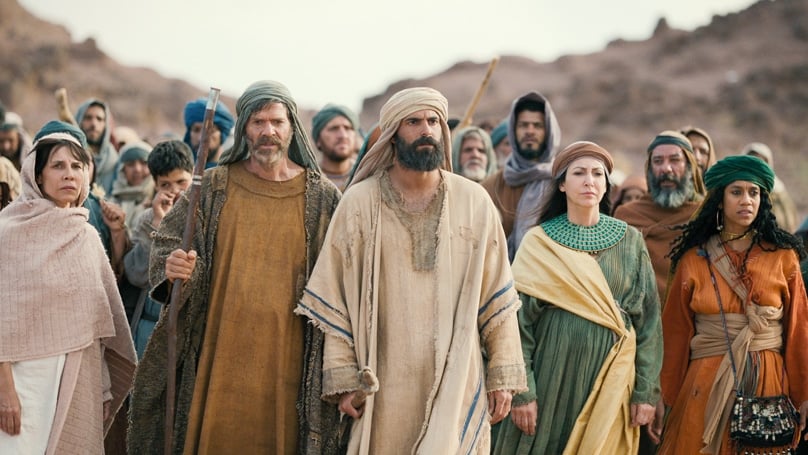
The story of Moses is not only important for Jews and Christians, but Muslims too.
Moses’ journey from persecuted to prince to prophet, as found in both the Book of Exodus and the Quran, has captured the hearts of billions of people over millennia through Scripture, scholarly works and the arts.
Following (from afar) in the footsteps of films such as The Ten Commandments and The Prince of Egypt, Netflix has made its own contribution with the docudrama Testament: The Story of Moses, released during Holy Week.
Although this series doesn’t scale the summit of cinematic excellence, Testament does offer a fresh perspective, with a focus on the relationship between God and his people rather than that between Moses and Pharaoh.
Directed and co-written by Benjamin Ross, Testament tells the story of Moses from cradle to the grave in three hour and half long episodes.
The first episode (“The Prophet”) follows his birth, exile, and return to Egypt; the second (“The Plagues”) sees the epic and climatic showdown between Moses and Pharaoh; and the third (“The Promised Land”) picks up from the parting of the Red Sea with the 40-year wandering in the desert, before entering the Promised Land.
Unlike past Netflix docudramas that leaned on story and lacked expert analysis, Testament enriches its engaging narrative with insightful commentary from historians, theologians, archaeologists, rabbis, imams, and linguists.
The inclusion of the Muslim perspective may be an interesting element for Christian viewers unfamiliar with Islam’s views on Moses.
The series finds a good balance between story and analysis which neither kills its dramatic momentum nor dilutes its expositional discourse.
Well placed commentary not only adds fluidity to the narrative but produces a clear picture of Moses’ universal significance as the series editors successfully weave together the various voices across Christianity, Judaism and Islam into one cohesive narrative.
While talking head interviews with author Dr Celene Ibrahim and Pastor Tom Kang offer interesting insights into the meaning behind significant translations from the ancient texts; and Rabbi Maurice Harris grapples with questions surrounding Yahweh’s actions which some consider more cruel.
Biblical studies professor Dr Peter Enns shows how each of the plagues were not only forces of freedom but signs that the God of the Hebrews were mightier than all those worshipped in Egypt.
Even more interesting, the series continuously brings back the events that unfold back to Yahweh’s relationship with the Hebrews which is quite novel for a medium so focused on the story’s iconic action.
The escalation of suffering of the Hebrews wasn’t just a consequence of Moses’ demands and Pharaoh’s hardened heart, as has so often played out on the silver screen, but in permitting it to occur, God was preparing his people for the promised land.
The series suggests that after 430 years under Egyptian rule, the Hebrews had forgotten parts of their history, culture and faith.
Moses is portrayed almost as a kind of catechist, teaching them about Noah and the flood, and other biblical stories.
One commentator even claims Israel had developed a kind of Stockholm syndrome, which paralysed them from escaping.
As a result, salvation had to come from someone who was on the outside of this trauma.
Ultimately, Israel’s suffering in both Egypt and in the desert was a purification of sorts, a way for them to be completely freed from physical and psychological bondage.
Not much can be said from a production standpoint besides that the special effects, acting, sets and costumes are on par with many of the docuseries on Netflix today.
And apart from a few anachronistic hints of modern progressive politics, with Moses depicted somewhat as a social justice warrior of his time, Testament is an insightful docudrama that makes profound observations with broad religious significance across faiths.
Testament: The Story of Moses is rated M for Mature themes and is currently streaming on Netflix.
